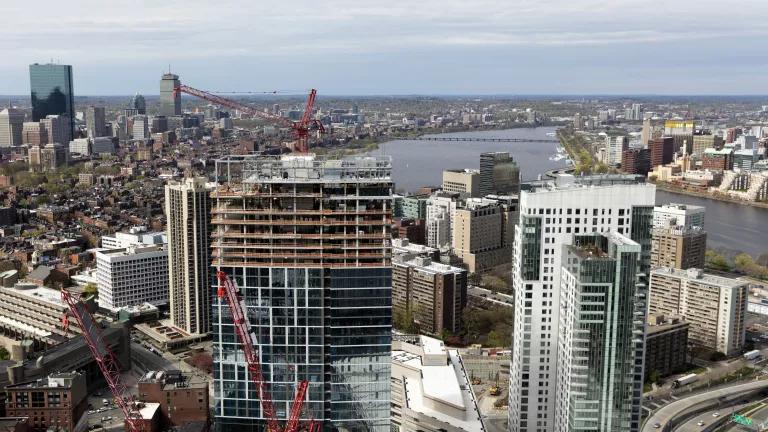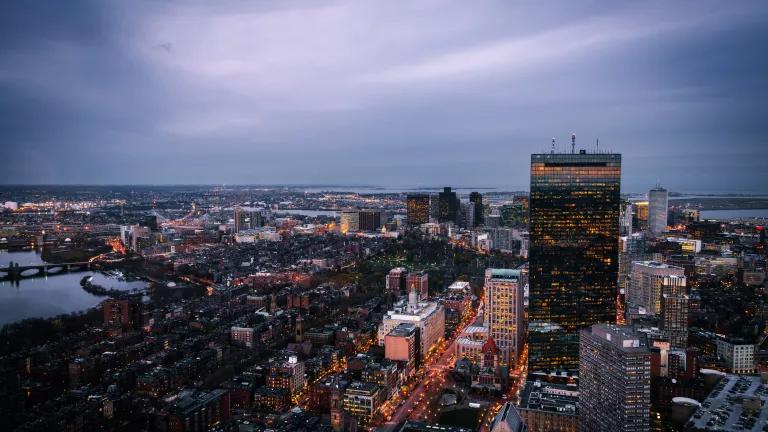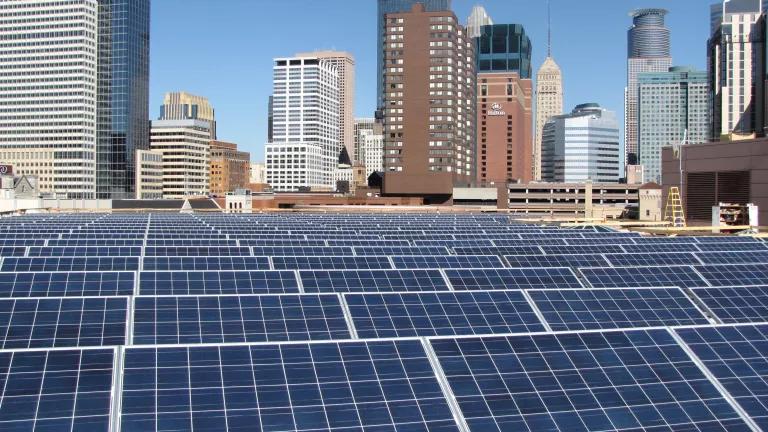High-Road Clean Energy Jobs: The Key to Building Back Better
Forward-thinking cities should aim to build back better—and more inclusively—by supporting strategies for a more equitable and sustainable future.

With multiple COVID-19 vaccines now making their way through the country, cities can begin looking ahead to economic recovery from the pandemic. But many forward-thinking cities want to do more than simply return to March 2020 employment numbers. They’re also aiming to build back better and more inclusively by supporting strategies for a more equitable and sustainable future.
Incorporating principles of economic inclusion into climate planning is key to accomplishing a sustainable, just recovery. This means being intentional about both the quality of jobs created (ensuring they are high-road jobs) and who has access to them. With this approach, cities can ensure that a sufficient and well-paid local workforce is in place to meet the needs of increasingly challenging climate goals while also increasing economic opportunity for people of color and low-income populations.
Prior to the pandemic, the clean energy job market was booming, surpassing fossil fuel jobs by three to one. The pandemic slowed this down significantly, as was to be expected with job rates plummeting across all sectors in 2020. However, unlike some industries, the renewable energy sector still saw a 0.8 percent growth, adding 166,566 jobs between June and October.
To ensure that these opportunities support career pathways and are accessible to people with barriers to quality employment, several cities from the Bloomberg Philanthropies American Cities Climate Challenge are launching new workforce development and economic inclusion programs supported by Emerald Cities Collaborative and Inclusive Economics—two leading organizations and core partners to the Climate Challenge who work at this nexus of climate and economic inclusion. Their leadership and insights have helped cities understand the connections between climate policies and economic impacts and better integrate the two while simultaneously supporting cities in advancing specific policies.
Here are three of the most exciting ones happening in 2021.
Boston
In Suffolk County, which has lost more than 2,200 clean energy jobs since last March, the city of Boston is supporting remote building operator certification (BOC) training. BOC-certified building managers have been shown to save buildings up to $20,000 a year in energy costs. The energy savings are so reliable that the training is fully subsidized by the local utility energy efficiency programs. Boston’s efforts, alongside partners like A Better City and LISC, have increased the number of trainings offered and generated increased interest from building owners, and BOC is now also incorporated into classes at the local community college. The core BOC Level I curriculum has even been approved by the Green Building Certification Institute (GBCI) as continuing education for LEED professionals, which means students who are not already LEED professionals will receive a solid training foundation. Level II continues the coursework but with a focus on energy efficiency: The program trains students on how to evaluate and optimize HVAC systems, among other skills geared toward cutting energy costs in many types of buildings, from schools and offices to airports. These green skills will be in especially high demand, given the city’s goal of carbon neutrality by 2050. Emerald Cities has consulted with the City’s Department of Environment on inclusive contracting practices under the RENEW Boston Trust, and has sourced minority, disadvantaged and women-owned contracting firms for energy efficiency work on municipal buildings through the Emerald Cities Boston Contractor Academy.
Charlotte, North Carolina
Charlotte—located in Mecklenburg County, North Carolina, which lost more than 2,300 clean energy jobs since March—launched a Renewable Energy and Efficiency Workforce (RENEW) program. Inclusive Economics supported the City on this project through advising, helping draft the RFP and reviewing proposals. Through partnerships with Urban League of the Carolinas (ULCC) and Goodwill Industries of the Southern Piedmont, RENEW provides heating, ventilation, and air conditioning (HVAC) credentials through virtual and hands-on training for residential and commercial buildings. Graduates from the program will have access to career opportunities in renewable energy and energy efficiency with industry leaders such as Trane Technologies, MSS Solutions, and others in the field. Recruitment has targeted residents who have been displaced or disadvantaged due to the pandemic, and participants receive a stipend of $15 an hour during the 13-week course.
RENEW, which will help Charlotte achieve its sustainability goals, has received widespread praise from both the first set of graduates (in a virtual ceremony on December 17) and from Research Triangle Cleantech Cluster, which conferred upon the program a 2020 Cleantech Innovation Award.
St. Paul, Minnesota
St. Paul has set ambitious goals for reducing its carbon emissions by 44 percent (ideally, 50 percent) by 2030, including: increasing solar use to 200 megawatts; reducing energy consumption by 10 percent; and retrofitting 19,000 homes to be energy efficient. As outlined in the city’s 2019 Climate Action & Resilience Plan, these targets will need a substantial workforce of trained technicians. “Addressing climate change requires skilled workers in all of the building trades and we want to utilize our union apprenticeship programs to build toward this effort,” says Donald Mullin, Executive Secretary of the St. Paul Building and Construction Trades Council. This is why St. Paul is collaborating with state and regional partners to make sure that the city's climate efforts are aligned with access to good career-track training opportunities, like earn-as-you-learn union apprenticeship programs.
The partnership, called the St. Paul Careers in Climate and Energy Initiative (SPCCEI), is a cross-sector collaboration between industry, labor, government, and community organizations committed to climate resilience, equity, and workforce development in the construction and energy industries. SPCCEI is building a robust workforce development program with the goal of “apprenticeship readiness” for residents in marginalized and under-represented communities, especially women and individuals who identify as BIPOC. "We want to be a major contributor to climate solutions that are inclusive and lift everyone up," says Russ Stark, the city’s chief resilience officer. This placement in an apprenticeship is the start of a pathway into good, middle-class careers in the building trades. Given the 15 percent decline in clean energy jobs in Ramsey County, and 17 percent in the greater Twin Cities region, these types of training programs will be valuable in the city’s recovery, post-pandemic. Inclusive Economics worked directly with the City’s Resiliency Office to determine where the biggest job opportunities were, which stakeholders to bring to the table, and provided continued support throughout this process such as identifying partner roles, pursuing funding, and facilitating bi-weekly meetings to develop the climate careers strategy.
With a new president in the White House and a national COVID-19 plan soon to be implemented, Climate Challenge cities are ready to hit the ground and build career pathways and to build back more inclusively than before. These programs will help them plot a solid course to sustainable prosperity.



